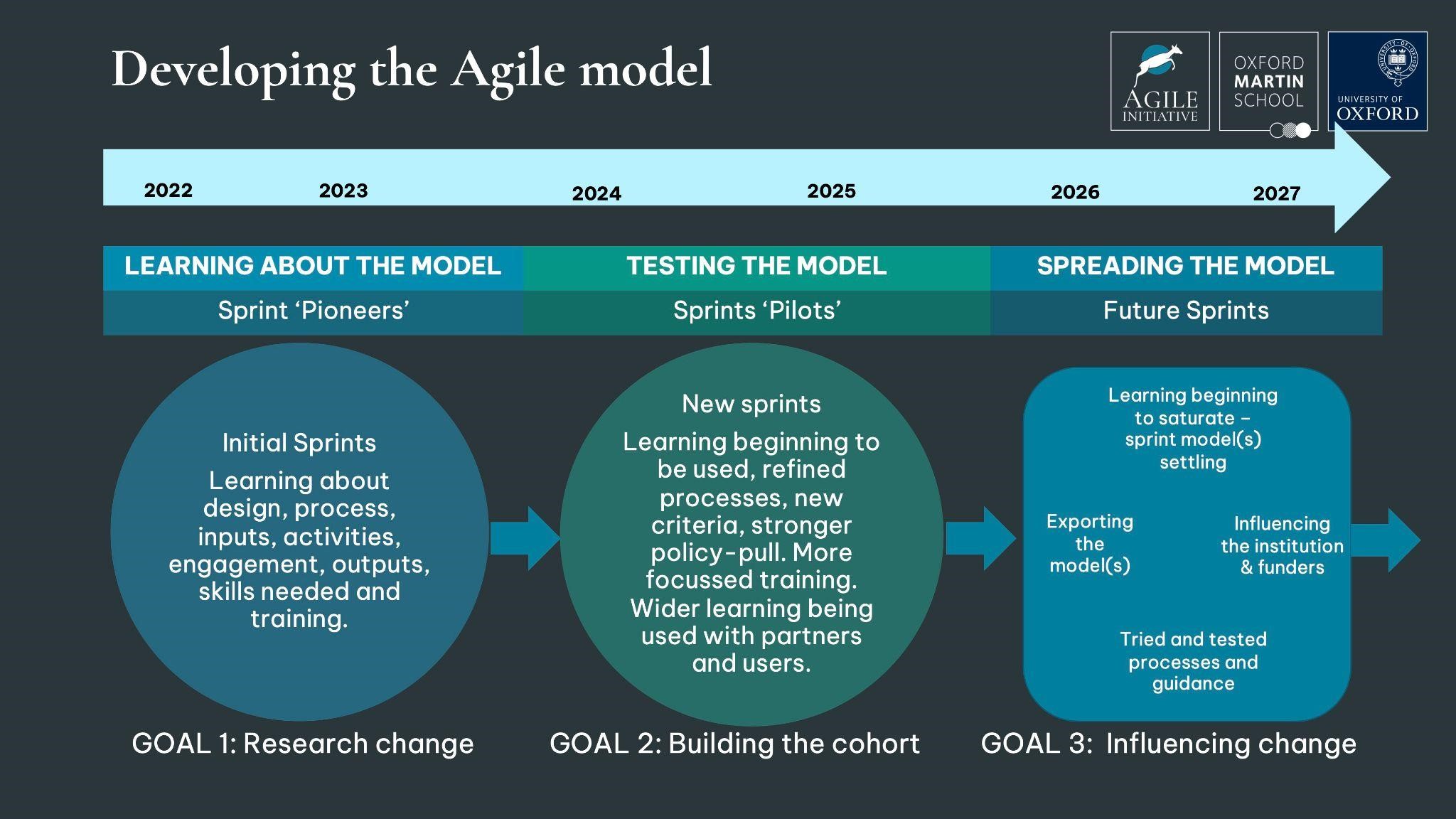The story behind our new call for Sprints
recent news
- Growing Positive Change
- The Agile Initiative Enabling Fund
- Pre-announcement: Next Sprint Funding Call to Open in September 2024

This week, we launched a new call for policy-led Agile Sprints. This represents a key milestone in the Agile Initiative’s process of experimentation in developing novel ways of doing and enabling the impact of applied environmental policy relevant research. Here, we share some of the thinking and activity that has gone on behind-the-scenes to produce this new call for sprints.
Why are we launching a call like this?
The Agile Initiative has goals around (i) conducting innovative but highly policy-relevant environmental research, (ii) building capacity and research-practice communities around doing this type of research, and (iii) shifting institutional cultures and incentives to support it. The experimentation and learning done in our Agile Sprints is a key part of all three of these goals. The sprints are key sites to directly achieve the goals, experiment with new ways of addressing them, and generate the learning to share more broadly. As such, we are on a learning curve with each round of sprints. The way a sprint is defined and organised is not static, but is constantly evolving, as the figure below attempts to show.

The key evolutions in the sprints so far are:
- Pioneer sprints to start the learning: Our six ‘pioneer’ sprints were developed as part of our initial bid for funding from NERC. These sprints reflected the priorities and expertise of the proposal team, as well as interest and engagement from a range of users. There was a lot of variety in the topics and level of co-production, but also in the form of these sprints. Moreover, the level of clarity on what a sprint actually is was low since we were only just beginning.
- Piloting the sprint model further: We are really proud of the impact of the pioneer sprints, and the learning from them has been invaluable. In summer 2023, we launched our first fully open call for sprints (which we loosely refer to as ‘pilots’), where we asked for researchers at Oxford to submit sprint ideas. Building in our learning from the pioneers, we were quite strict on ensuring the sprints met our emerging understanding of what a sprint should look like, but we still left the topics relatively open to the ideas and interests of researchers.
- Piloting a stronger policy connection: Two of these pilot sprints are now live, and we learned a lot from the process of receiving a large number of sprint ideas from researchers and making judgements on them.
For this new call (February 2024), the main point of difference is that researchers need to respond to sprint topics identified directly by policy makers and analysts working in environmental domains. In effect, before the call has even gone live, we have gone through an initial cycle of co-creation and prioritisation with policy partners, with the intention being that we bake in relevance and impact from the start.
How did we pull this call together?
So, what have we actually done to create this call? The main thing, since September 2023, has been a broad round of engagement with policy makers, policy analysts, and practitioners from across the environmental research space. For now, we will refer to these diverse groups as ‘policy partners’ for simplicity. Initially, we reached out to a range of policy partners, from different levels of government and public sector organisations, the third sector, and the private sector. We were essentially asking policy partners what topics they thought Agile sprints should be focussed on, and if and how they would like to be involved.
It quickly became clear that the response and interest was strongest from public sector organisations, and especially from those in the UK. This reflects our positioning as a UK university, a programme funded by UKRI, and the well-established links between research and public policy in the UK. Much of the research that ensues will have local and global relevance, so we felt comfortable with this focus for this call since the UK environmental public policy field is probably the single highest priority ‘user’ of our research – both the substantive work of sprints, and the more meta work on the environmental science-policy interface.
We decided to follow the demand at this stage. Through multiple conversations with different teams in UK government and public sector organisations, we ended up with the list of ten topics found in the call. This was a fairly iterative and organic process, but built on our learning thus far about what a sprint can look like, what topics might make sense, and what issues might arise. We also tried to speak to as many teams as possible, both on the policy and analytical side of things in government, rather than those individuals we happened to know.
We have made efforts to make this set of sprint topics, and the call more broadly, inclusive. We have tried to ensure there is variety in the types of knowledge the sprints are seeking to develop and apply, but there was definitely a tendency from policy partners towards proposing more quantitative approaches. We are also trialing a new approach to how the call is structured, such that individuals can apply to be part of a sprint, even if they are not already connected into established teams working on these areas. We are also continuing to ask applicants to consider how they will approach equality, diversity, and inclusion, and we will assess responses on this.
Overall, we are pleased with how the process has worked thus far. Engagement has been strong, organisations have been thoughtful and helped us prioritise, and we are excited by the list of topics that has emerged. However, it has been time-consuming work at times, and of course there are many other potential topics and partners. Time, the response to the call, and the sprints that we fund, will ultimately be the judge of how we have done.
Folding learning into future calls
Just as we have learnt from previous sprints to create this call, we will capture learning from this round for the future. In future calls, we expect to make a stronger effort to engage with private and third sector organisations, and to include more international partners (though it is worth noting, we do have broader focus from existing sprints already).
We will also reflect carefully on the policy-led model of providing topics for researchers to respond to. Whether and how we do this again are open questions. We are keen to ensure our work is agenda-setting, as well as meeting evidence needs, so a balance will need to be struck. We have an ambitious programme-level research effort underway to understand what is working or not in the Agile model as a whole, and we will be able to fold this formal learning into future sprints too.
We plan to launch a further call in autumn 2024. No decisions have yet been made on what the future holds for our sprints, and we welcome your feedback and ideas.



